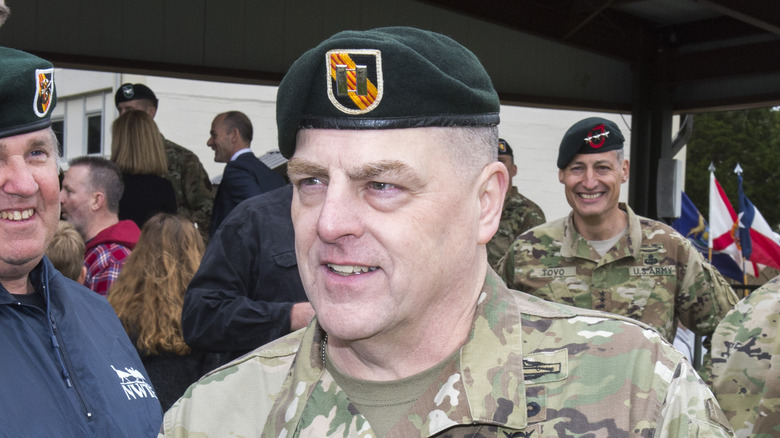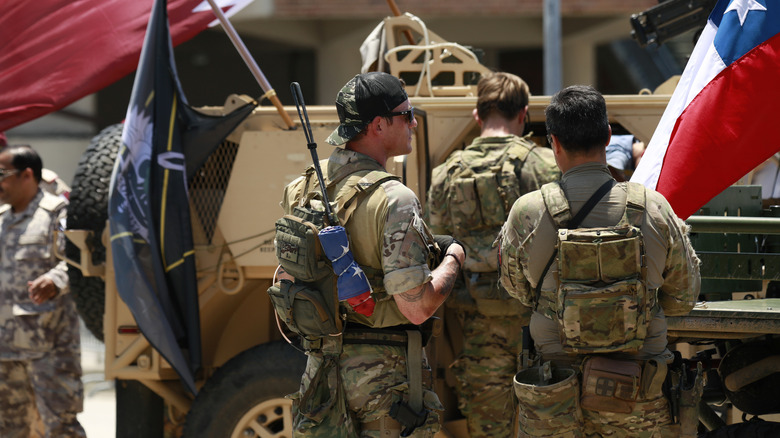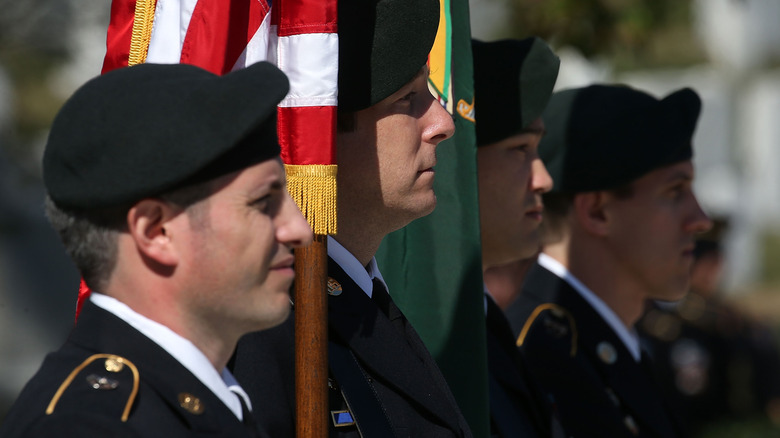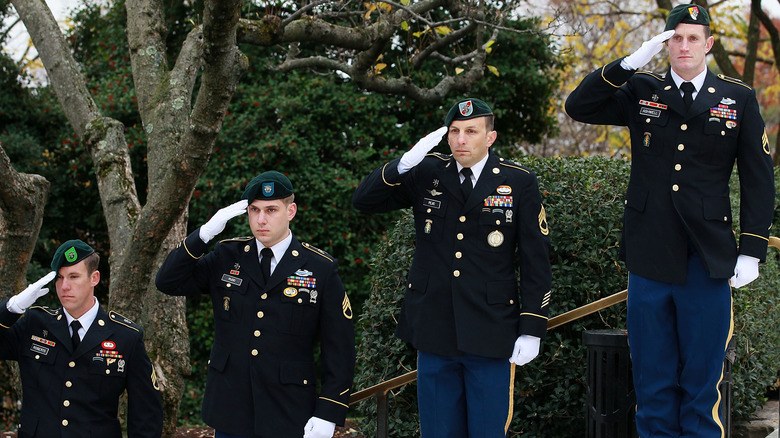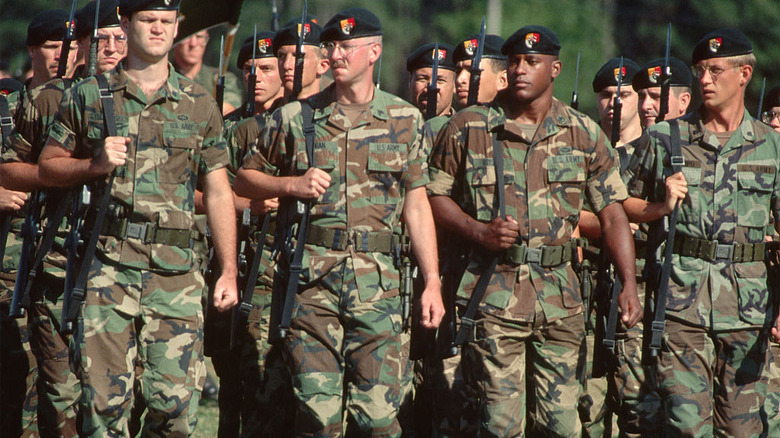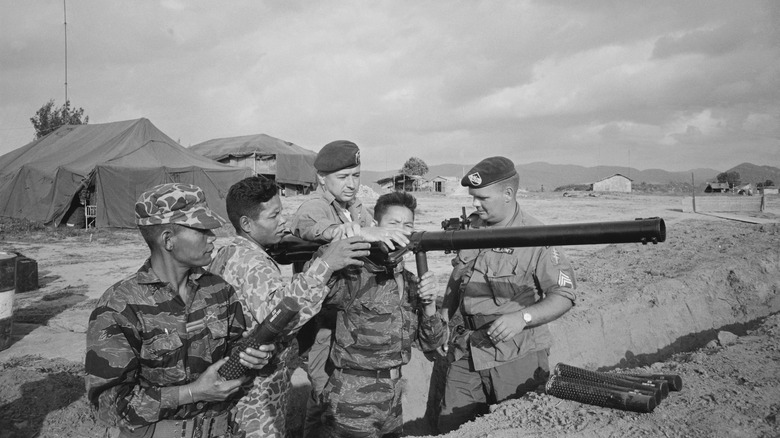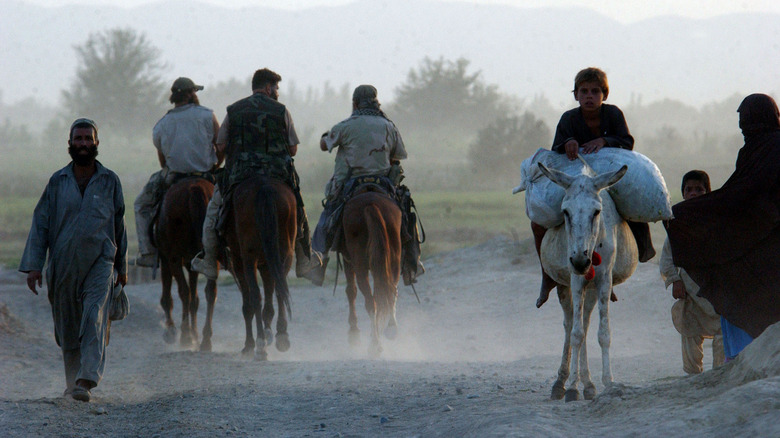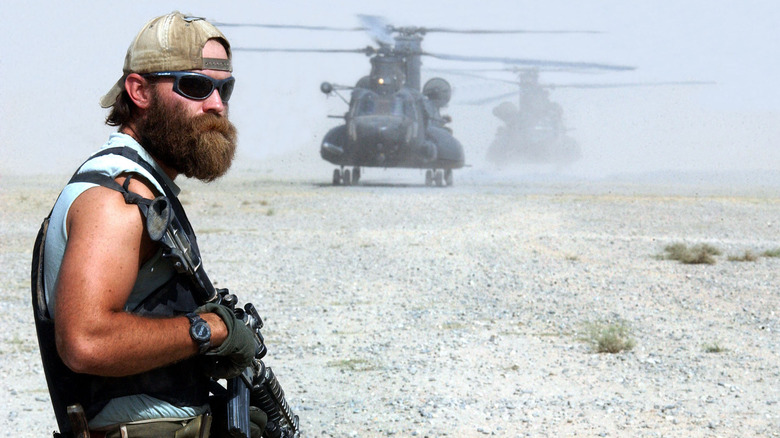Strict Rules Green Berets Have To Follow
Being a special forces soldier in any branch of any military force is not the same thing as being a soldier in the regular military, and with the power they wield comes more responsibility. Just like Delta Force has strict rules they have to follow and SEAL Team Six has some odd rules to follow, the Green Berets have their own set of requirements, traditions, and skills necessary to make it out of training and into some of the most dangerous situations on the planet.
The history of the Green Berets is older than any other special forces branch of the military. They were officially created in 1952 to tackle unconventional warfare problems, but their roots stretched back to World War II. The then-unofficial headgear they donned was a nod to two foreign forces their predecessors worked closely with during that war: the French (who wore berets) and the British (who wore a lot of the same shade of green). It wasn't until 1961 that President John F. Kennedy made the Green Beret's green beret official; one year later, he called it "a symbol of excellence, a badge of courage, a mark of distinction in the fight for freedom" (via The U.S. Army Airborne & Special Operations Museum).
These days, the distinctive and well-known beret comes with a whole load of responsibilities for the fighters who have proved themselves good enough to wear one. Here are some of the strict rules Green Berets have to follow.
The entry requirements are strict
There are required qualifications to join any branch of the military at even the lowest level, but Special Forces hopefuls don't stand a chance unless they prove themselves above and beyond. So not only are there straightforward requirements, like being between 19 (20 for current soldiers) and 34, being in the acceptable height and weight range, and getting a good score on the Armed Services Vocational Aptitude Battery (a test recruits take to see what jobs in the military they will be best at), but much harder ones as well.
You can't be considered for selection as a Green Beret if you don't qualify for entrance to the Airborne School, for example, because the mental and physical ability to jump out of planes will be expected of you once you are in combat zones. And if you have anything shady in your past that will make you unable to get a secret security clearance, your dream of wearing a jaunty green cap is already dead. If you are already an officer in the Army, you'll need an even cleaner record to qualify for top-secret clearance. And while women can qualify, it's incredibly rare.
If you look good on paper and make it to the initial two-week course, there are still plenty of reasons you wouldn't survive Special Forces training. Only candidates who excel will go on for another 61 weeks of training. This starts with an intense 24-day assault on your physical and mental abilities and ends with an "invasion" of a fake country in the woods of North Carolina.
Green Berets need to be good with languages
Based on "Rambo" and other films about badass military men who go around kicking enemy butt with all guns blazing, you wouldn't think studying a foreign language was a big part of Special Forces training. But if you want to be a Green Beret, being able to master a second language isn't an option or a bonus, it's one of the most important requirements. That's because Green Berets go where other members of the military don't. They live among locals and work with citizens in other countries to achieve their objectives in a way regular military forces do not. And the key to making sure that goes smoothly is literally being able to speak the language. Green Berets do not show up in foreign countries with translators in tow; they are expected to be able to communicate on their own.
The Army's list of languages Special Forces soldiers might learn includes French, Indonesian-Bahasa, Spanish, Arabic, Chinese-Mandarin, Korean, Persian-Farsi, Russian, Tagalog, Thai, Levantine, and Arabic (Egyptian). How is it decided which language you learn? First, you have to master one that is completely made up. Yup, in order to pass the Defense Language Aptitude Battery, Green Beret hopefuls learn a fake language, meaning there is no way they could have come in with previous knowledge.
If you think you can coast because you are already bilingual, sorry. In that case, you will find yourself learning a third language so you can be sent to a wide variety of countries.
Green Berets are expected to be understated
Making it into the Green Berets means you have proved you are the best of the best. But part of what makes someone good enough for the Special Forces is the fact that they don't need to go around talking about how awesome they are. So if you want to use being a Green Beret or their exploits as a brag for the rest of your life, you are definitely not going to be a good fit. And don't even think about writing a book about what you did in the military after you retire.
In 2010, when the CBS News show "60 Minutes" embedded with some Green Berets in Afghanistan, a soldier named Martin told the program, "We're definitely not Rambo, you know? He was a Green Beret. That's not us at all." The group's nickname is "the quiet professionals," which neatly sums up what is expected of them.
Even when they can't hide from recognition for their heroic deeds on the battlefield, Green Berets are humble about it. In 2011, six Special Forces soldiers were honored with the Croix de la Valeur Militaire — the French Cross of Military Valor — by that country's government. Army National Guard Captain Thomas Harper said (via the National Guard website), "We're very quiet in what we do. We don't expect recognition. We don't look for it. This has been a little much for us today, ... but we're happy that we could be here and that the French felt they could give us this extreme honor."
They can never surrender
Until you've been in a combat situation, it is impossible to be sure what you would do under that kind of pressure — especially if things start going bad. But Green Berets know what they definitely won't do: surrender. While the United States Military Code of Conduct also mentions not surrendering, there is a bit of wiggle room in the wording: "I will never surrender of my own free will. If in command, I will never surrender the members of my command while they still have the means to resist" (via the National Archives). The creed of the Special Forces has no such gray area. It says plainly: "I will never surrender though I am the last" (via the Association of the United States Army).
There is plenty of historical evidence that Green Berets take this promise seriously. Retired Army Colonel Paris Davis received the Medal of Honor for his bravery during combat in Vietnam. During a firefight, despite being wounded himself and ordered to get himself to safety, he refused and saved the lives of four fellow soldiers. About the experience, he wrote, "Collectively, we never accepted defeat, nor did we let our guard down. The enemy forces outnumbered us, but we never went into combat for any other reason than to win" (via the U.S. Department of Defense).
Captain Roger H.C. Donlon was also awarded the Medal of Honor for his actions in Vietnam. Despite the enemy insisting he surrender over a loudspeaker, he fought back even harder, eventually forcing their retreat.
Being expert networkers is essential for Green Berets
Green Berets never expect to go into hostile territory and do things on their own. Not only do they need to work with their fellow Special Forces soldiers, but a large part of their job in any combat zone will be working with locals in various capacities. In many cases, like when stationed in Vietnam (pictured above) and Afghanistan, this included training the local militaries on how to fight their mutual enemies. Therefore, it is necessary for them to be good with people and excellent networkers.
Since Green Berets are expected to be almost fluent in the language of wherever they are deployed, this means they are the perfect soldiers to build a deeper rapport with locals. This can include important members of the community who might have information vital to helping the Green Berets complete their objectives or find the individuals they are looking for. Being able to sit down and have a cup of tea and a cordial conversation with a tribal leader, for example, is not only an important skill but could be what leads to a mission's success.
Some have pointed out that the training and experience Green Berets get in many ways makes them perfect for important roles in the business world, and one of the most helpful crossover skills is that ability to network. After all, once you have proved yourself as a Green Beret, no negotiation or social interaction in a corporate setting is going to be the slightest bit disconcerting,
Blend in with locals
The Green Berets work closely with locals, which means that on top of knowing the language, they also need to understand the customs and beliefs of the people whose turf they are on. But their ability to build rapport and blend in goes a step further. The U.S. military has strict codes for what a servicemember needs to look like, wear, and even what kind of haircut they have. When you are a Green Beret in a combat zone, however, the biggest rule is to blend in, and if that means breaking regular Army uniform codes, so be it. Teams that are allowed relaxed grooming standards are known as "long-hair teams."
In many cases, especially in the various Middle East wars the U.S. has been involved in during the 21st century, looking like a local means growing a beard. This stereotype is so widespread that the Duffle Blog (a military-themed satire site similar to The Onion) ran an article with the headline "Soldier Kicked Out Of Special Forces Because He Can't Grow A Beard." While that's a joke, it only works because beards on Green Berets in combat zones are so common that it can almost come off as a requirement. It's why one of the group's nicknames is the "Bearded B*****ds."
The relaxed standards go beyond facial hair, though. It's also common for Green Berets to dress in the style of local clothing. Whatever it takes to fit in better and therefore give their mission the best chance possible.
Green Berets still have strict rules of engagement
While the Green Berets were started specifically to tackle the types of unconventional warfare situations that present complex ethical and tactical decisions, that doesn't mean they get to throw out the whole rulebook. Special Forces are still expected to follow the rules of engagement and if there is even a question over whether they did so or not, they can find themselves back in the United States facing questions and even charges.
A lot of messed up things happened during the Vietnam War. One of those came to be known as "The Green Beret Affair." While working with the CIA, eight Green Berets were involved in hunting down and killing a suspected double agent. Since the killing was extrajudicial, the eight men were going to be court-martialed, but the charges were dropped after the CIA flatly refused to let any of their employees testify in open court for national security reasons. The whole situation was a disaster and further divided Americans who disagreed on the country fighting in Vietnam in the first place.
More recently, in Afghanistan in 2006, Captain Dave Staffel ordered Master Sergeant Troy Anderson to shoot an unarmed man in civilian clothing who was standing about 100 yards away. It would turn out the man was on an official list of enemy combatants, and therefore the killing was considered acceptable under military rules. However, the two Green Berets were still investigated twice and almost court-martialed before eventually being found innocent of any wrongdoing.
